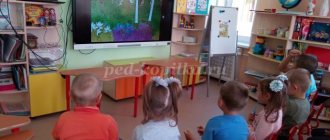Journey to the land of interesting games: a project for children of senior preschool age
Rizyapova I.I., Khabibullina V.N. Journey to the land of interesting games: a project for children of senior preschool age // Owl. 2022. N 4 (18). URL: https://kssovushka.ru/zhurnal/18/ (access date: 01/19/2022).
Order No. 431957
APPENDIX: Approximate game plan for the implementation of the project “Journey to the Land of Interesting Games”
Type of project : speech, cognitive and creative.
Implementation time: long-term.
Project participants: children 5-6 years old, 6-7 years old, teachers, parents of students.
Relevance of the topic:
Currently, the requirements of the educational system for the speech development of children have increased. The Federal State Educational Standard has defined as one of its objectives the development of the abilities and creative potential of each child as a subject of relationships with himself, other children, adults and the world. The comprehensive development of a preschooler can be achieved only on the basis of play activities, during which the child develops imagination and the symbolic function of consciousness, gains experience in communicating with peers, and comprehends moral values and rules of behavior in society.
In this regard, the issue of developing verbal creativity in preschool children using various methods and technologies is relevant.
Based on the above, goals and objectives were set for the development of verbal creativity of older preschoolers in the process of developing gaming technologies that stimulate verbal creativity and independence of children.
Goal: Development of speech creativity of preschool children in the process of play activities through inclusion in various types of activities, teach them to speak the Tatar language, develop dialogic and monologue speech.
Tasks.
Educational:
- to cultivate independence, initiative through the organization of play activities, positive relationships between children and adults.
- cultivate a desire to communicate in the Tatar language.
Educational:
- develop variable thinking, imagination and creative abilities, curiosity, observation, the ability to experiment, create conditions for the formation of fantasy, imagination, and creativity.
- improve all aspects of speech: achieve clear pronunciation of all sounds of the native language, expand and activate the vocabulary, continue to develop dialogical speech,
- develop interest in learning the Tatar language, promote speech understanding and the desire to speak and communicate in another language.
Educational:
- teach word creation;
- teach forms of monologue speech in the Tatar language;
- teach answering questions in a short and common form.
Project implementation principles:
- Accessibility: taking into account the age characteristics of children; adaptability of the material.
- Systematicity and consistency: gradual presentation of material from simple to complex; frequent repetition of acquired knowledge, rules and norms.
- Visual and entertaining: the proposed material must be understandable, have an entertaining beginning, be playful or have elements of a game or surprise.
- Dynamism: integration of the project into different activities.
- Supporting children's initiative in various activities.
- Taking into account the individual characteristics of each child.
- Introducing children to sociocultural norms, traditions of the family, society and state.
Stages of work on the project
Stage I – information and analytical support for the project.
- Collection and analysis of information.
- Selection and study of literature on project activities.
- Study of advanced pedagogical experience in developing children's ideas about play.
- Selection of methods for pedagogical diagnostics of pupils and parents (observation of children, individual conversations).
- Analysis of the results of pedagogical diagnostics.
Stage II - main
Scheme for implementing work experience in areas of development
| Directions of development | Types of games in joint activities of adults and children and independent activities of children |
| Social - communicative | Didactic, role-playing, nature history games. Board games, word games, bonding games, social interaction |
| Speech | Didactic games, speech games |
| Cognitive | Didactic games, word games, educational games, board and printed games, games with mathematical content |
| Artistic and aesthetic | Games - dramatization, games - dramatization, folk games, games - round dances, logorhythmics |
| Physical | Outdoor games with words, games with speech accompaniment, physical exercises, logarithmics, motor games. |
Stage III – final
Generalization of work experience.
Collaboration with parents
- Visual information: consultations “Speech development: games with the family”, “Games for the development of creative imagination”. Recommendations for parents “Game is serious”, “The world in a child’s creativity.” Publication of the pedagogical and parent newspaper “Krepysh”.
- Children and parents projects: “Creative workshop”, “Interesting games”, “Dreamers”, “Rhyme”.
- Step-by-step drawing: “You start, and I will continue.”
- Exhibitions of drawings: “Fairytale World”, “Abracadabra”, “Nonexistent Country”.
- Questionnaire: “Does your child like to fantasize?”
- Baby dictionary “Our children come up with it.”
- “Parents’ Diary or “Nechukovsky” from 2 to 5.”
- Competition of inventions: “Funny story”, “Changes”.
- Training “Sharing family experience.”
- Mailbox "Question and answer".
- A collection of ideas: “An unusual toy.”
- Family gatherings.
Expected result of project activities:
- To introduce children to the process of cognition through involving them in various types of practical and play activities.
- Develop cycles of game-activities for sections of the project, each of which would combine elements of different types of activities.
- Create a positive microsociety where each participant (adult and child) develops in the process of joint activity and co-creation.
- Increase the authority of the teacher and other preschool employees.
- Increase the pedagogical competence and activity of parents.
- Invite kindergarten teachers to participate in the implementation of the project to create comfortable conditions for the child.
- Teach children to speak the Tatar language, develop dialogic and monologue speech.
- Encourage parents to want to independently organize joint, creative games with their children at home.
Approximate game plan for the implementation of the project “Journey to the Land of Interesting Games” (Appendix).
Literature:
- Dyachenko O.M., Agayeva E.L. What doesn't happen in the world? 2001.
- Zaripova Z.M. Tatarcha sөylәshәbez // Methodology kullanma. Kazan, 2012.
- Karpova S.I., V.V. Mamaeva. Development of speech and cognitive abilities of preschoolers 4-5 years old // Creative Center. St. Petersburg, 2010.
- Kukushkina E.Yu., Samsonova L.V. Playing and learning to be friends // Teacher's Library. M.: Creative Center, 2013.
- Miklyaeva N.V. Interactive pedagogy in kindergarten // Library of the journal “Preschool Education Management”. M.: Creative Center, 2012.
- Miklyaeva N.V., Reshetilo E.A., Lopatina O.G. Play environment at home // Teacher's Library. M.: Creative Center, 2011.
- Miklyaeva N.V., Yu.N.Rodionova. Developing the abilities of preschoolers // Teacher's Library. M.: Creative Center, 2010.
- Penkova L.A., Konnova Z.P., Malysheva I.V., Perkova S.V. Development of play activity of preschoolers // Management. M.: Creative Center, 2010.
- Skorolupova O.A., Loginova L.V. Let's play?.. Let's play!!! From work experience. M., 2006.
- Shchetinina A.M. Teaching preschoolers to think // Teacher’s Library. M.: Creative Center, 2011.
Project. Development of role-playing games in the middle group of kindergarten
Project “Development of role-playing games in the middle group of kindergarten”
Author: Yulia Galimzhanovna Novoselova, teacher of State Budgetary Educational Institution Secondary School No. 276 (preschool department), Moscow Abstract: This project will be of interest to teachers of middle groups and senior preschool age groups.
The project was implemented in the middle group of a kindergarten and is aimed at developing the creative abilities and independent play activities of children, amplifying the play experience of preschoolers. Project details
Educational organization: GBOU secondary school No. 276 Preschool department group No. 6 “Dwarfs”. Project name: “Development of role-playing games in the middle group of kindergarten.” Project type: Game, creative. Implementation period: medium term (February-May 2013). Project participants: group (teachers, students).
Project goals
• Development of play as the main activity of children; • Amplification of pupils’ gaming experience; • Using the game for educational purposes.
Project objectives
• Development and enrichment of play actions with toys based on the enrichment of individual play actions; • Development and enrichment of game plots; • Formation of communication skills, with “conspiracy to play”, distribution of roles and role-playing dialogues; • Updating children’s desire to follow their role and follow the rules of the game; • Fostering friendly relationships between children, interest in a common plan and coordination of actions.
Expected Results
• Expanding children's understanding of the variety of ways to use toys, substitute objects and play activities; • Formation of skills for independent organization of the game, distribution of roles, creative development of the plot of the game; • The ability of pupils to play in an organized manner in small groups, to join in and leave the game.
Project implementation
Preparatory stage
• Defining the goals and objectives of the project;
• Study of literature, original methods; • Diagnostics of the level of development of children’s creative activity and relationships in the team; • Drawing up an action plan for the implementation of the project. As part of the preparatory stage, I diagnosed the level of development of children's creative abilities, the presence of gaming experience, communication skills and abilities for independent gaming activities. Diagnosis was carried out using the following tests: Test “Child Taking on a Role” Revealed the following results: • The desire of most children for the main role; • Conflict situations in the distribution of roles; • Limited set of game actions; • Difficulty in defining “a known rule of behavior that reflects real action and real relationships”; • Rapid loss of interest in the accepted role. The test “Stability in obedience to the game rule” revealed the following results: The game rule is not formulated, it is easily transformed at the request of the children. The test “Features of a role-playing game” revealed the following results: • The idea of the game in most cases is proposed by the teacher, rarely initiated by the children;
• Discussion (conspiracy to play) occurs in a jumbled manner, without verbal formulation of the goal of the game, limited to the distribution of roles; • The main content of the game is actions with objects, monotonous manipulations with gaming equipment, several game actions that imitate everyday relationships; • A small number of game plots: “Clinic”, “Chauffeurs”, “Family”, “Shop”; • The plot is presented in several game actions, without independent creative development; • Role-playing dialogues between children are limited to a few phrases, objective actions prevail; • Active use of toys, substitute objects, verbal designation of substitute objects in the game; • The result of the game, as a rule, is not formalized; • Involvement of the teacher in the game, in case of difficulties with the further development of the plot of the game. Main stage
Direct implementation of the project in a group: conversations, observations, reading fiction, didactic games, productive activities, theatrical games;
organizing joint or independent play activities for children with the teacher. Long-term planning of project implementation in the group First stage.
Enriching ideas about the area of activity that the child will display in the game (observations, stories, conversations and impressions). Introducing children to people, their activities (who is doing what, why. Second stage. Organizing a role-playing game (“game in preparation for the game”): 1. Determining situations of interaction between people, thinking through and composing events, the course of their development in accordance with the theme of the game; 2. Creation of an object-based play environment based on the organization of productive and artistic activities of children, co-creation with the teacher, children's collecting; 3. Joint play activity of the teacher and children. Third stage. Collective and independent play activity of children, organization of role-playing games with an imaginary partner for whom the child speaks. The final stage of the project
Drawing up a project passport, summing up the results.
Results of the project implementation in the group
• Significant expansion of gaming techniques, methods of using gaming equipment and substitute items; • Qualitative change in the level of children’s communication skills, development of role-playing dialogues, variability of characters played; • Independent initiation of the game, combining several plots, creative development of the game situation; • Successful inclusion of children in the game and successful exit from the game; desire to implement the game plan; • Children’s active position on the “realism” of the role played by all participants in the game; broadcasting the player’s “should” behavior for this role; • Significantly increased interest of pupils in role-playing games, supplementing the games with theatrical sketches of children; • Obvious educational effect: improving the culture of behavior and relationships; development of observation skills; attention to the surrounding reality; respect for the results of others and one’s own work.
List of used literature
1. Akulova O.V., Solntseva O.V. Educational field “Socialization. Game" How to work according to the "Childhood" program: Educational and methodological manual / scientific editor: A.G. Gogoberidze - St. Petersburg: LLC "CHILDREN'S PRESS PUBLISHING HOUSE", 2012. - 176 p. 2. Program FROM BIRTH TO SCHOOL. Basic general education program for preschool education / Ed. N. E. Veraksy, T. S. Komarova, M. A. Vasilyeva. - M.: MOSAIKA-SYNTHESIS, 2010. - 304 p.; 3. Role-playing games for older preschoolers: a practical guide / N. A. Vinogradova, N. V. Pozdnyakova. — 3rd ed. - M.: Iris-press, 2009. - 128 p. — (Preschool education and development); 4. Role-playing games for preschool children / N.V. Krasnoshchekova - Rostov n/D: Phoenix, 2006 - 251 p. – (School of Development).
We recommend watching:
Plot-role-playing game in the senior group of kindergarten Summary of the plot-role-playing game "Cafe" for the senior group of kindergarten Project in the middle group "On the pages of Bazhov's fairy tales" Plot-role-playing game in the senior group "Theater"
Similar articles:
Creative project in the senior group on the topic “The Mysterious World of Insects”




